The term salmon, in the culinary world, refers to several subspecies of the family Salmonidae, of which are known for their characteristic pink flesh and high oil or lipid content. Primarily a cooked dish, certain types of farmed salmon may also be used in raw fish dishes like sashimi, though this requires rigorous hygiene protocols to be followed1.
Like all high protein meats or seafood, salmon has a relatively short shelf-life when left out in the improper storage conditions, causing waste and spoilage if not looked after or consumed immediately. This has led many chefs and fishermen to ask the question; can you freeze salmon?
Salmon, though being largely water, will freeze quite well, especially if prepared for this very purpose. This is not to say, of course, that no degradation of the fish’s quality will occur. Like all other foodstuffs, they are best enjoyed fresh, with freezing only acting as an intermediate storage method.
What is Needed to Freeze Salmon?
In order to freeze salmon, you will require several resealable freezer bags or plastic pouches, aluminum foil, lemon juice or similar acidic fluids (though this is optional) as well as a freezer capable of reaching temperatures at or below 32°F.
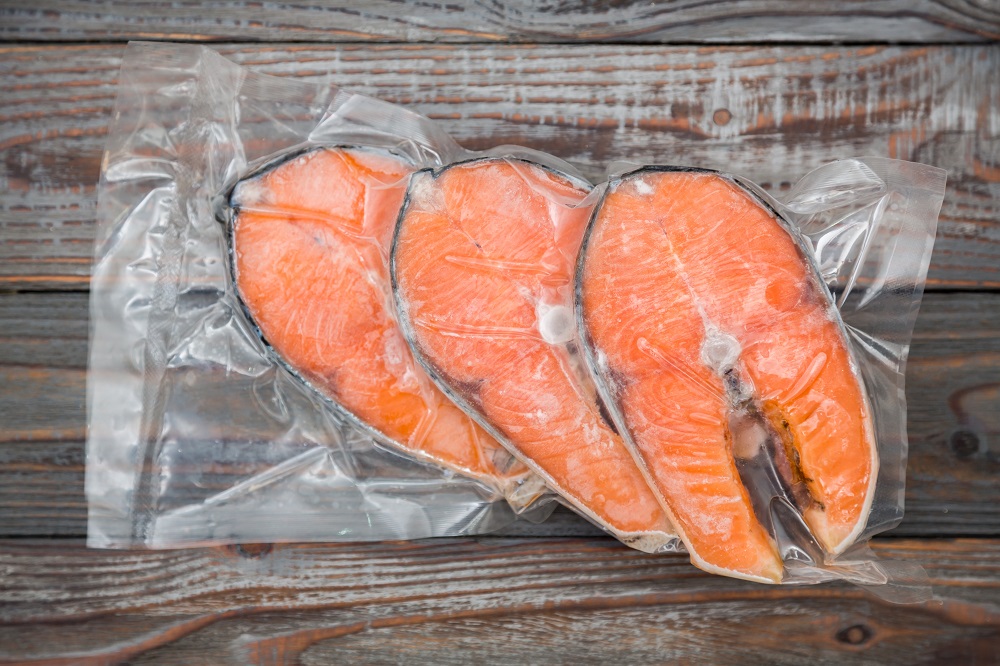
How to Freeze Salmon?
Much like storing the salmon in your refrigerator, first ask your butcher to debone the salmon and remove its internal organs. It is also possible to do this yourself, though hygiene must be maintained and it is important to not rupture the gastric system of the salmon, which may release bacteria and parasites into the surrounding flesh.
Once the salmon has been cut suitable for freezing, wrap the individual fillets or pieces in aluminum foil, using several sheets wrapped around the fish in alternating directions in order to leave no open spaces of flesh exposed to the freezer air, which may cause freezer burn and affect the salmon’s texture.
Now wrapped in aluminum foil, pile your approximate serving size of salmon into each individual plastic pouch or freezer bag. The salmon pieces are separated in this manner because thawing the entire batch will rapidly decrease their shelf-life, as well as the fact that repeatedly refreezing the salmon pieces will impact their quality and appearance somewhat.
Place the plastic pouches or freezer bags of salmon in the deepest part of your freezer, far away from any freezer vents or fans, as these will still cause freezer burn, even with the insulating layer of aluminum foil in place.
How Long Does Fresh Caught Salmon Last at Room Temperature?
Bacteria and fungi are an ever-present threat in practically any environment. This is all the more so an unsterilized place with uncontrolled airflow like that of a grocery store or kitchen counter.
Once these bacteria or fungi make contact with a suitable source of food, they begin to propagate rapidly, and as they eat they begin leaving behind toxic compounds that are harmful to the human body if ingested.
It is because of this that researchers at the U.S. Department of Agriculture refer to any food storage environment between 40°F to 140° as the “danger zone”, wherein most types of organic foods (especially fish and poultry) are at the most risk of becoming infested with microbes if left at said temperatures for too long.
And as such, fresh caught salmon that has had no other attempts at preservation made towards it will only last up to two hours within the danger zone or at room temperature. This is not to say that the salmon has already begun to spoil, however it is best to proceed with caution if the salmon has remained exposed to the elements for this long of a period.
Can You Refrigerate Salmon?
A far more advisable alternative than leaving your salmon on the kitchen counter, we fully recommend all home chefs either refrigerate their salmon if they plan to consume it within three days or to otherwise freeze it for longer-term storage requirements.
The benefit to refrigerating salmon as opposed to freezing it is that there will be a minimal loss of quality so long as the salmon is stored properly and is not left in the refrigerator for more than seventy two hours.
In order to begin freezing salmon, first cut the meat into your desired fillets or pieces, discarding the intestines and other organs, both of which may contain microbes or intestinal parasites which will hasten the spoilage of the salmon flesh.
If so desired, you may salt the flesh, which will draw excess moisture out of it and extend its shelf-life by a short length of time.
Prepare an air-tight container free of moisture and made of a material that will not absorb the smell or juices of the salmon, such as non-porous plastic or glass.
Gently place the cuts of salmon in the air-tight container, making sure not to crush any parts as this will cause them to spoil faster.
Store the container of salmon in the deepest part of your refrigerator, far from the crisper which may cause condensation to form within the storage container.
Can You Freeze Cooked Salmon?
When food undergoes the cooking process, the complex molecules that comprise the molecular make-up of your food are broken down by catalytic factors like heat, the presence of acids, and even direct physical agitation.
As such, the salmon becomes unsuitable for freezing as the rigors of a freezing environment will ruin both its texture and taste. However, there are exceptions to this fact, such as if the salmon has been stewed or otherwise encased in an insulating layer, such as cream sauce or pastry dough.
Dried salmon, on the other hand, does not even require freezing at all and can be kept in an air-tight container in the pantry or cupboard.
References
1. Unknown Author. “What’s an oily fish?”. Food Standards Agency. 24 June 2004. Archived from the original on 10 December 2010.
2. Unknown Author. (June 2017) “”Danger Zone” (40 °F – 140 °F)” U.S. Department of Agriculture Food Safety and Inspection Service
3. Lackey, Robert; Lach, Denise; Duncan, Sally, eds. (2006). Salmon 2100: The Future of Wild Pacific Salmon. Bethesda, MD: American Fisheries Society.

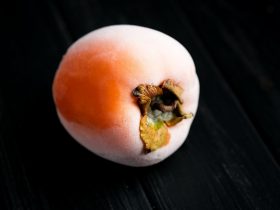
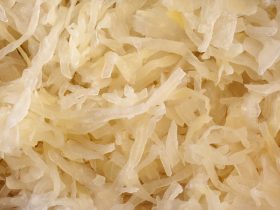
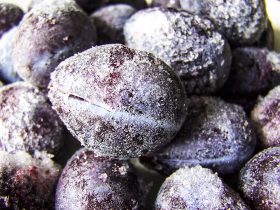
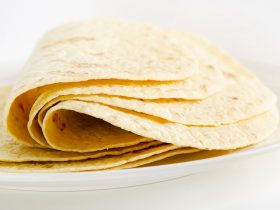
Hi, I'm Dom
Dom Eats was started to help other people fall in love with food. While cooking can feel intimidating, it doesn't have to be.